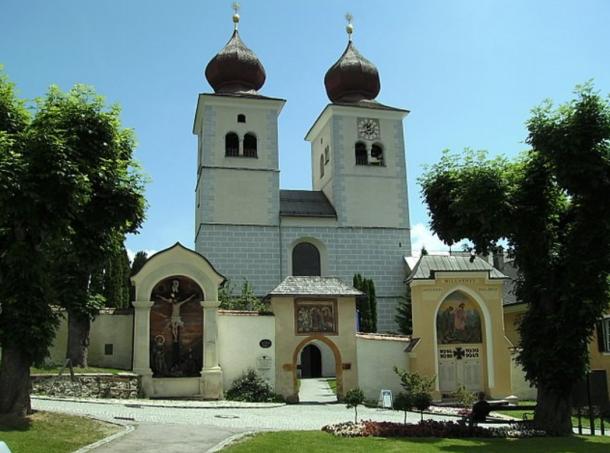
Domitian of Carantania, the Prince Who Became a Saint
Domitian of Carantania is an important figure in the early medieval history of the Eastern Alps, particularly in the region known today as Slovenia. Living during the 8th and 9th centuries AD, Domitian played a crucial role in the Christianization and political development of Carantania, an ancient pagan Slavic principality. His life and deeds are enveloped in a mix of historical facts, legends, and ecclesiastical records, offering a fascinating glimpse into the complexities of early medieval European history and the origins of Slovenia as well.
Domitian, the Prince of Carantania and the Origins of Slovenia
Domitian's early life is not well-documented, but it is generally accepted that he was born in the early 8th century AD to a noble family. Carantania, his homeland, was a Slavic principality situated in what is now modern Slovenia and parts of Austria. During Domitian's time, Carantania was slowly transitioning from Slavic paganism to Christianity, influenced by neighboring regions and the growing power of the Frankish Empire which was its western neighbor. The region's strategic importance and the cultural shifts of this period provided the backdrop for Domitian's rise. Some sources suggest that Domitian was the successor of the third Prince of Carantania, known as Vatlunk. Either way, it is known that he was a “prince” and held considerable power within Carantania.

Domitian depicted in a 1429 fresco, Millstatt Abbey Church (Public Domain)
One of Domitian's most significant contributions during his rule was his role in the Christianization of Carantania. The spread of Christianity in the region was part of a broader movement orchestrated by the Carolingian dynasty, which sought to consolidate its power and expand its influence through religious conversion. Domitian, believed to have been a person in position of considerable power, was instrumental in this process. He worked alongside missionaries from Bavaria and other parts of the Frankish Empire to establish Christian practices and institutions in Carantania.
Of course, Domitian's efforts in promoting Christianity were not merely religious but also political. By aligning with the Carolingian rulers, he helped secure their support, which was crucial for maintaining peace and stability in Carantania. This alignment also facilitated the integration of Carantania into the broader Carolingian Empire, marking a significant shift in the region's political landscape. To the east were other Slavic nations, many of whom were under the sway of the Byzantines and Eastern Orthodoxy. By aligning himself with the west, Domitian shaped the dynamics of the region for centuries to come.
The Shaping of Pagan Carantania
Domitian's influence extended beyond the religious sphere and into the political realm. His close ties with the Carolingian rulers, particularly Charlemagne, provided him with a substantial degree of political power. This relationship is evident in various historical records that mention Domitian's involvement in diplomatic missions and his role in negotiating the terms of Carantania's integration into the Carolingian Empire. It was around this time that Carantania was integrated into the expanding empire of Charlemagne - it became the March of Carinthia in 889.

Modern statue of Domitian, casting a pagan idol into Lake Millstatt (Popie /CC BY-SA 3.0)
As a political leader, Domitian was known for his efforts to maintain autonomy for Carantania while also embracing the benefits of being part of the Carolingian realm. He skillfully navigated the complexities of early medieval politics, balancing the interests of local Slavic nobility with those of the Frankish overlords. This balancing act was crucial in preserving Carantania's unique cultural identity while also ensuring its survival in a rapidly changing political environment. Domitian's legacy is also evident in the cultural transformation of Carantania. The introduction of Christianity brought with it new forms of art, architecture, and literacy, which Domitian actively promoted. Churches and monasteries were established, becoming centers of learning and cultural exchange. These institutions played a vital role in the preservation and dissemination of knowledge, contributing to the intellectual and cultural development of the region. Domitian is credited with founding Millstatt Abbey church, which still stands today.
Domitian's influence on the cultural landscape of Carantania is also reflected in the legends and folklore that surround his figure. He is often portrayed as a wise and just ruler, embodying the virtues of both a devout Christian and a capable leader. These stories, passed down through generations, highlight the lasting impact of his contributions to Carantania's cultural heritage. After his death, he was venerated as a saint and his relics were thought to have healing properties, being worshiped by the locals for centuries.

Millstatt Abbey Church ([email protected]/ CC BY-SA 3.0)
The Enduring Legacy of a Carantanian Prince
The legacy of Domitian of Carantania has endured through the centuries, and he is remembered as one of the pivotal figures in the region's history. His efforts in promoting Christianity and navigating the political complexities of his time laid the foundation for the future development of Carantania and its integration into the European medieval world. What is more, it laid the foundations for the later emergence of Slovenia as we know it today.
There is no doubt that his efforts in Christianizing Carantania, forging political alliances, and promoting cultural development left a lasting mark on the region. His life continues to be studied, offering valuable insights into the complexities of early medieval society and the pivotal role of charismatic leaders in shaping the course of history.
Top image: Modern statue of Domitian of Carantania, casting a pagan idol into Lake Millstatt located in the shallow water of Alpine lake in Austria. Source: Chris/Adobe Stock
References
Luthar, O. 2008. The Land Between: A History of Slovenia. Peter Lang.
Šavli, J. 1999. Slovenski svetniki. Humar.
Štih, P. 2010. The Middle Ages Between the Eastern Alps and the Northern Adriatic: Selected Papers on Slovene Historiography and Medieval History. BRILL.















